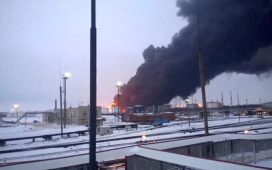
Oil spill response in Norilsk
Russian President Vladimir Putin ordered a state of emergency Wednesday in the Taymyr region near the Arctic Ocean, after 20,000 tons (150,000 barrels) of diesel fuel spilled from a Russian power plant into surrounding soil and a nearby river. The accident occurred in the Siberian city of Norilsk on Friday May 29, after the plant’s fuel reservoir collapsed into thawing permafrost, releasing its contents. Diesel is more toxic than unrefined crude oil, meaning more danger for cleanup crews and the surrounding ecosystem.
In a conversation with Putin, Governor of the region Alexander Uss admitted that authorities only reacted to the situation two days after the incident, stating that experts initially assured him that there was no danger of pollution. “Only after the appearance of disturbing images on social media and persistent questions, the real picture of the incident became known to officials on Sunday morning” said Uss. The head of the Ministry of Emergencies, Yevgeny Zinichev, confirmed that his department learned about the incident only on May 31.
Putin criticized the ownership of the NTEC power and heating plant in a televised video conference for their slow reaction to the emergency: “Why did government agencies only find out about this two days after the fact? Are we going to learn about emergency situations from social media? Is there something wrong with you?” Putin asked of NTEC chief Sergei Lipin in an unusually stern dressing-down.
Following the meeting, Putin instructed law enforcement agencies to investigate why the information about the accident was delayed.

BBC
The Ministry of Natural Resources said that regional authorities would not be able to handle the spill in Norilsk on their own and would require assistance from the Ministry of Emergencies with the involvement of the army. Putin made the declaration of federal support shortly thereafter.
In terms of environmental impact, initial assessments appear dire. The concentrations of oil pollutants in the water near Norilsk are tens of thousands of times more than the normal limit, according to the head of Rosprirodnadzor (Federal Service for Supervision of Natural Resources). Thus far, the diesel oil has spilled over a distance of 20 kilometers, causing $13 million in damages, and counting. Regarding cleanup, authorities are saying that diesel can only be completely removed through burning or natural evaporation – both terrible options for the Arctic’s fragile ecosystem. In the meantime, a total of 262 tons of diesel fuel has been collected near the power plant, a total of 800 cubic meters of contaminated soil has been removed and approximately 80 tons of fuel has been collected from the spill to Ambarnaya river.”

Emergency crews pump diesel fuel out of the Ambarnaya river near Norilsk’s Combined Heat and Power … [+]
Greenpeace is calling the Norilsk event the worst spill in the history of the Arctic, comparing it to the Exxon Valdez tanker which spewed 287,000 metric tons of oil into the Arctic Ocean in 1989.
Melting permafrost, which in this case caused the support beams of the diesel reservoir to collapse, is a troubling and widespread phenomenon in the world’s coldest regions. As the earth warms, once frozen soil begins to melt, turning terrain into thick mud and destroying any infrastructure built atop the soil. Thawing permafrost also releasees tremendous amounts of heat-trapping methane gas into the atmosphere, accelerating the global warming process. According to experts, some 2.5 million square miles of permafrost — 40% of the world’s total — could disappear by the end of the century.
Russia, until recently a global warming skeptic, is discovering the hard way what climate change could mean for its future. Tens of thousands of miles of roads and pipelines that criss-cross the Arctic are now in jeopardy. Moscow has no technical capabilities, technology, or money to secure this vital infrastructure and protect the environment.
The Norilsk disaster may portend a bleak road ahead for the world’s largest Arctic power.
With Assistance from Károly Barabási








